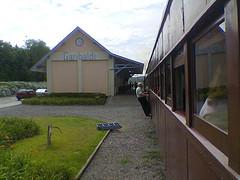Victor Hugo
In 06/09 the governor of Paris, general Trochu, assumed the control on behalf of ' ' Government of Nacional' Defense; '. Victor Hugo returned from the exile; 300.000 parisienses had been mobilized to defend the city. Trochu in the truth feared two enemies: the prussianos and the socialist ones of the laboring quarters. From 15/09 the city was surrounded by the prussianos. An attempt of general Ducrot to bar the advance of the enemy failed in 19/09; Versailles fell in the following day. From 23/09 a line of communications with the remain of the country was established by means of manned balloons. In 08/10 it had a rebellion principle to knock down Trochu and to install a socialist government, then controlled. In 27/10 they had left Paris the last foreign legations.
The situation becomes depressing: the prussianos limit to bomb it city they wait that if income; the parisienses wait in the inactivity that some army comes of the west to breach the wall. Meanwhile they face fomes and illnesses. But in 29/11 Trochu tries to breach the wall, without success; the fight was extended up to 03/12 around the bridges of the Marne; it had 12,000 losses. The cold increases the suffering of the civil population; it has enormous loss of life of children. From 27/12 new cannons of the Krupp they intensify the bombing. The animals of the zoo are sacrificed and vendidos to feed the population. At the beginning of January the bombing is still more intense.
It has chronicle food lack and coal. In 18/01 attempt had despaired to breach the wall with integrant of the Garde Nationale. It had 1,500 died. The new defeat provoked the fall of Trochu and its substitution for general Vinoy. In 22/01 it had new socialist agitations, with five died. Finally, in 26/01/1871, the city capitulated.
 In other words Vargas it does not only depend being able on them regional separate. The speech the eves of the New State, is the unit, is the brasilidade. 1. REGIONALISM AND PERSPECTIVE NATIONALISM The year of 1930, in terms social politicians and is significant not alone for Brazil, for the occured changes, but mainly for the Rio Grande Do Sul, that inside of the optics of the Republic of the Coffee with milk was relegated to the second order in the status national politician. Ceased the internal disagreements in the Rio Grande Do Sul, between Liberators and Republicans, in 1927, Vargas goes up to the government of the Getlio State.
In other words Vargas it does not only depend being able on them regional separate. The speech the eves of the New State, is the unit, is the brasilidade. 1. REGIONALISM AND PERSPECTIVE NATIONALISM The year of 1930, in terms social politicians and is significant not alone for Brazil, for the occured changes, but mainly for the Rio Grande Do Sul, that inside of the optics of the Republic of the Coffee with milk was relegated to the second order in the status national politician. Ceased the internal disagreements in the Rio Grande Do Sul, between Liberators and Republicans, in 1927, Vargas goes up to the government of the Getlio State.  The anarchists, for its extremism and aggressiveness of its leaders, had finished for gaining more prominence in the medias and the forms of repression lead by the bourgeois classroom. The tactics for which the anarchists had been known were the direct action; they condemned any type of participation of the work force in the consisting governments and considered the general strikes as form of desestabilizar capitalist system e, at the same time, as form to incite the spirits of the laboring classroom. The idea of the direct action age to catch the bourgeois classroom of surprise, at a moment where its industrial activities were paralyzed by a general strike. In 1890 it is created by a group of socialist the first Laboring Party of Brazil. This party carries through two congresses, the first one in 1892 and as in 1902.
The anarchists, for its extremism and aggressiveness of its leaders, had finished for gaining more prominence in the medias and the forms of repression lead by the bourgeois classroom. The tactics for which the anarchists had been known were the direct action; they condemned any type of participation of the work force in the consisting governments and considered the general strikes as form of desestabilizar capitalist system e, at the same time, as form to incite the spirits of the laboring classroom. The idea of the direct action age to catch the bourgeois classroom of surprise, at a moment where its industrial activities were paralyzed by a general strike. In 1890 it is created by a group of socialist the first Laboring Party of Brazil. This party carries through two congresses, the first one in 1892 and as in 1902.